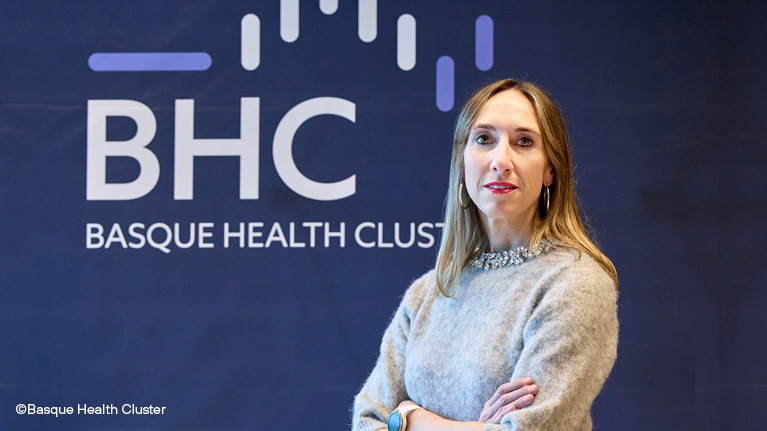Regulation is a key element for the success of customised healthcare
Idoia Muñoz, director general of the Basque Health Cluster

Customised healthcare is nowadays a very important component in medicine as it adapts treatments and technologies to meet the individual needs of patients . In this interview, Idoia Muñoz, director general of the Basque Health Cluster, the association of the bioscience and health sector in the Basque Country, describes the current situation and the constantly evolving challenges this field is facing. She also underscores the importance of regulating medical devices and reviews the stages to be covered for their integration in healthcare systems.
1.- Customised healthcare is becoming increasingly relevant, how do you view the current situation? What are the main challenges?
Customised healthcare has given rise to an in-depth transformation of medical practices as treatments can now be adapted to the individual features of patients. This improves therapeutic efficacy and reduces side effects.
We are, however, facing several significant challenges. Firstly, the incorporation of large volumes of personal and medical data in health systems requires robust solutions to protect patient privacy and safety.
Secondly, the implementation of customised technologies requires a closer collaboration between companies, researchers, clinicians and patients. Another outstanding challenge is the need to continuously update regulations and ensure that healthcare systems are resilient enough to adapt to these innovations.
2.- During the “Human-Centered Health Technologies” seminar your presentation will focus on regulatory challenges associated with medical devices. Why is their regulation important?
Regulating medical devices is crucial to ensure the safety and efficacy of these technologies. As smart medical devices will have a significant impact on the health and wellbeing of patients, they must comply with rigorous standards to prevent risks.
Regulation ensures that these devices are exhaustively evaluated prior to reaching the market and used in the clinical context. A suitable regulation, moreover, builds confidence amongst the general public and healthcare professional when these technologies are used, an absolute must for them to be broadly accepted and implemented
3.- What stages must medical devices go through before being included in a healthcare system?
Medical devices must cover several stages prior to being included in healthcare systems. It is the initial research & development stage when devices are designed and tested .
This is followed by a preclinical and clinical stage to verify their safety and efficiency.
Regulatory approval issued by competent authorities such as the European Medicines Agency (EMA) or the Federal Drug Administration (FDA) of the United States is then required.
Once approved, devices can be incorporated to healthcare systems via an adoption process that includes training for healthcare professionals and post-commercial monitoring to ensure that devices continue to operate safely and effectively.
4.- Do you think that Spain’s or, more specifically, the Basque Country’s innovation system is ready to face these challenges?
The ecosystems of Spain and the Basque Country are very dynamic and fully capable of coping with these challenges.
There is a very solid collaboration between academic institutions, companies and research bodies in the Basque Country in addition to a major focus on applied research and technology transfers.
In order to maximise the potential of these innovations, however, it is crucial to foster a collaboration between stakeholders in the ecosystem and guarantee a regulation that evolves coherently alongside technological advances. These advances and innovations, moreover, must reach patients and healthcare professionals and be used in health systems.
5.- Could you name a success related to smart medical devices?
Of course. In the Basque Country, for instance, there are several successes such as ULMA Medical Technologies, a Basque company that through a joint cooperation with healthcare professionals has developed a solution that universalises diabetic retinopathy screening and features a UMI DR software that has been certified with EU marking applicable to healthcare products as per regulation 2017/745 (MDR).
Another example is Legit.Health that supplies AI and computer vision technology to upgrade the care provided by doctors dealing with diseases that are visible on the skin and offer a totally disruptive and revolutionary service via image recognition and AI-generated recommendations. Naru Intelligence, is a technological firm specialised in oncology that provides AI and digital systems to further improve healthcare
6.- What trends do you expect in the future?
As regards medical devices, I expect a higher level of integration of AI and machine learning will be achieved in the area of medical devices. This will deliver more accurate diagnoses and provide highly customised treatments.
We also expect that portable technologies and connected devices will be increasingly used to perform continuous health monitoring at home.
By combining genetic data with health technologies it will be possible to make significant progress in customised medicine by offering treatments that are better adapted to the individual needs of patients.
7.- How do you think the seminar will help to foster innovation in the area of smart medical devices?
The “Human-Centered Health Technologies” seminar is essential to boost innovation in this field. Having a platform like this to exchange knowledge and experiences between experts, researchers and companies will speed up the development of new solutions.
The seminar will also help to identify and address regulatory and technical challenges collaboratively to facilitate the transition of innovations from the laboratory until they are applied in the healthcare system.
In summary, they will help to create an environment that is more dynamic and open to technological advances.
Idoia Muñoz will be one of the speakers at the Human-Centered Health Technologies seminar hosted by the Tekniker Technology Centre to be held in Madrid on September 25 & 26.
